Looking to add more fruits to your diet without packing on the calories? In this article, we explore the best low-calorie fruits that not only help you manage your weight but also deliver a range of essential nutrients. From refreshing citrus fruits like oranges and grapefruits to antioxidant-rich berries and melons, these low-calorie fruits are perfect for anyone looking to boost their nutrition without sacrificing flavor or health benefits.
Whether you’re aiming to lose weight, enhance your overall health, or simply want to enjoy healthy snacks, these fruits should be a staple in your daily diet. At ReciMe we can help you make the most of these fruits by organizing your meal plans, generating smart grocery lists, and allowing you to easily save and import recipes from Instagram, TikTok, Pinterest, and more. Download ReciMe now, power up your nutrition, and let’s explore the best low-calorie fruits to include in your diet!

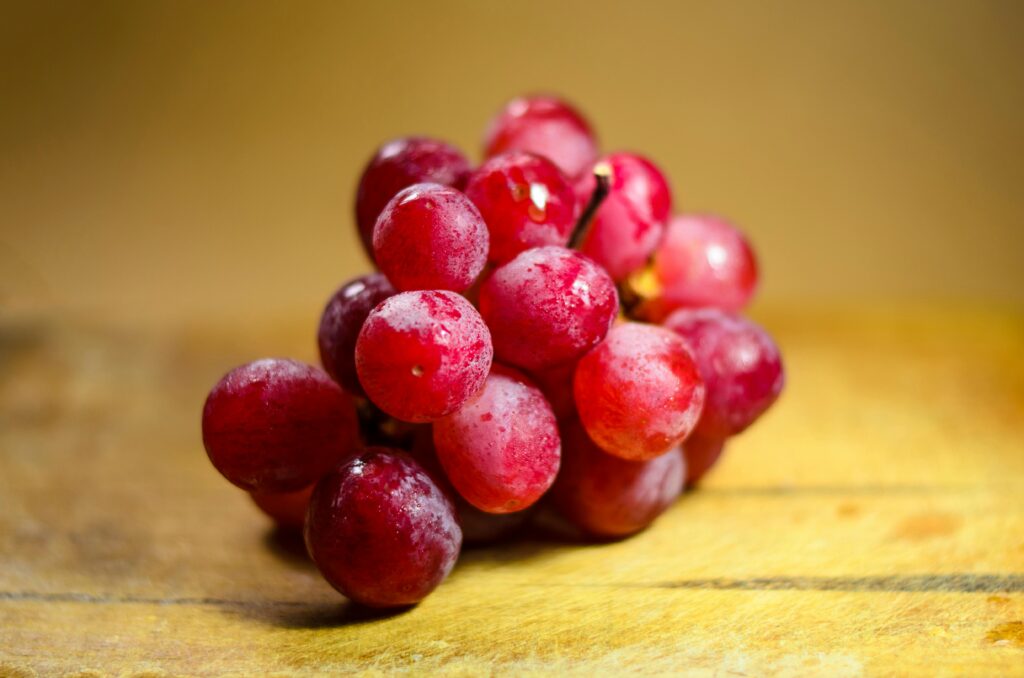
1. Grapes
Grapes are a low-calorie fruit that offers health benefits thanks to their antioxidants, including phenolic acids and anthocyanins. These compounds support immune health and help reduce inflammation. The nutritional value of grapes can vary between different varieties, so eating a mix can provide a wider range of benefits.
Grapes also help with blood vessel health, reduce blood pressure, and may lower the risk of chronic diseases. They are a good source of copper, vitamin K, and B vitamins, which play important roles in energy production and bone health. Grapes can be eaten fresh, frozen, or added to meals like salads and cheese boards.
Key Highlights:
- Rich in antioxidants to support health.
- Helps improve blood vessel health and reduce inflammation.
- Provides copper, vitamin K, and B vitamins.
- Low-calorie, making it a healthy snack option.
Who It’s Best For:
- People looking for a light snack.
- Those interested in heart health.
- Anyone wanting to boost their antioxidant intake.
- People who need a versatile fruit for meals.
2. Apples
Apples are a low-calorie fruit packed with essential vitamins and minerals like B and C, as well as potassium, calcium, and magnesium. They also contain antioxidants, including quercetin and catechins, which help protect against oxidative damage and support heart health.
Eating apples regularly has been linked to a reduced risk of conditions like asthma, cardiovascular disease, and some cancers. Their fiber content helps digestion and can keep you feeling full. Apples are easy to add to your diet whether eaten fresh, sliced into meals, or baked into recipes.
Key Highlights:
- Rich in vitamins and minerals.
- Contains antioxidants that support health.
- High in fiber for digestion and satiety.
- Easy to add to meals and snacks.
Who It’s Best For:
- People looking for a low-calorie snack.
- Those interested in heart health.
- Anyone needing a fiber boost.
- People who enjoy adding fruit to meals or baking.
3. Oranges
Oranges are a low-calorie fruit packed with essential nutrients. They are best known for their high vitamin C content, which helps boost the immune system. In addition to vitamin C, oranges provide vitamins A and B, which are important for maintaining healthy skin, vision, and overall body function.
The antioxidants found in oranges, such as carotenoids and flavonoids, play a role in preventing cancer and reducing the risk of chronic conditions like heart disease, obesity, and arthritis. Oranges are also rich in pectin, which may help improve cholesterol and blood sugar levels, as well as synephrine, which can support fat breakdown and mild appetite suppression.
Key Highlights:
- High in vitamin C, A, and B for immune and overall health.
- Antioxidants in oranges may reduce the risk of chronic diseases.
- Contains pectin and synephrine, which support heart health and weight management.
- Easy to include in various meals and snacks.
Who It’s Best For:
- People looking for a low-calorie, immune-boosting snack.
- Anyone interested in improving heart health.
- Those aiming to manage their weight.
- People who enjoy adding fruit to meals, smoothies, and baked goods.
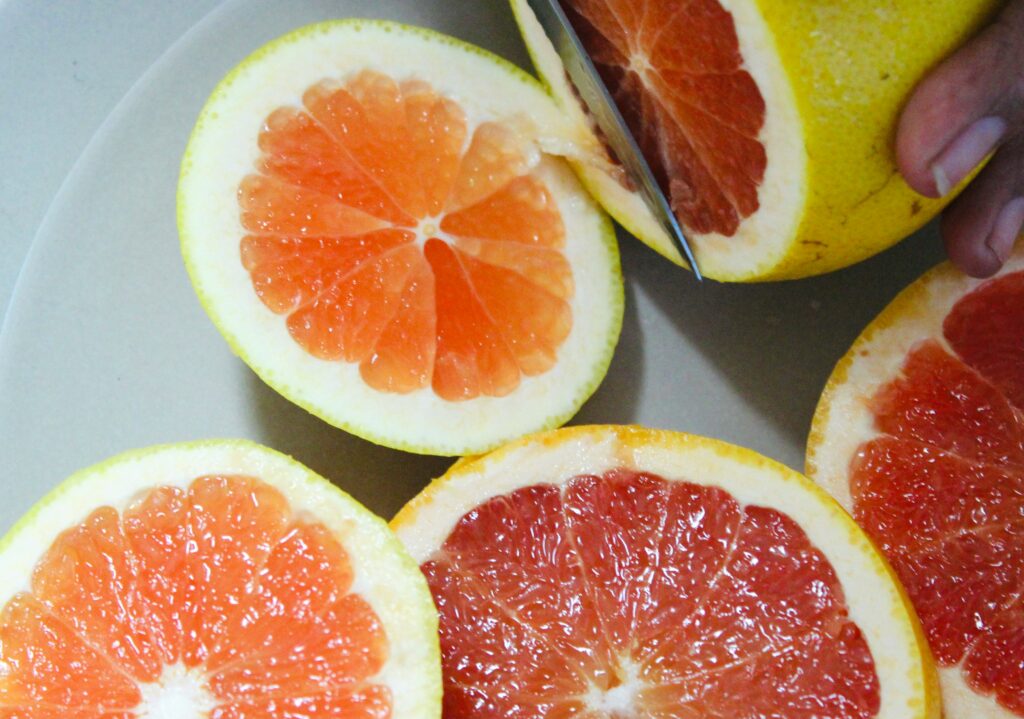
4. Grapefruits
Grapefruits are a low-calorie fruit and a great choice for anyone looking to reduce calorie intake. These citrus fruits are rich in vitamin C, which helps boost the immune system, supports skin health, and provides antioxidant protection.
The pink and red varieties of grapefruits are particularly high in beta carotene and lycopene, which are linked to a lower risk of stroke and protection against heart disease and certain cancers, including prostate and pancreatic cancer. Some studies also suggest that grapefruits may help with weight loss and lower cholesterol levels.
Key Highlights:
- High in vitamin C for immune and skin health.
- Rich in beta carotene and lycopene, supporting heart health and cancer prevention.
- May aid in weight loss and help reduce cholesterol levels.
- Easy to incorporate into meals, snacks, and drinks.
Who It’s Best For:
- Those looking for a low-calorie, nutrient-rich fruit.
- People focused on heart health and cancer prevention.
- Anyone interested in managing their weight or lowering cholesterol.
- Those who enjoy adding fruit to meals, smoothies, or drinks.
5. Papayas
Papayas are a low-calorie tropical fruit that offer a range of health benefits. They are a good source of vitamins A and C, which support immune health and promote skin and eye health. In addition, papayas are rich in antioxidants like lycopene, lutein, zeaxanthin, and beta-carotene, which may help protect against certain cancers, including liver and prostate cancer, as well as age-related eye diseases.
Papayas also support heart health due to their low saturated fat and cholesterol content, along with their high fiber, which may help lower cholesterol levels and reduce the risk of heart disease. These benefits, combined with their unique flavor, make papayas a great addition to any diet.
Key Highlights:
- High in vitamins A and C for immune and eye health.
- Rich in antioxidants that may protect against cancer and age-related eye diseases.
- Low in saturated fat and cholesterol, promoting heart health.
- High in fiber, supporting digestion and cholesterol management.
Who It’s Best For:
- Those looking for a low-calorie fruit with health benefits.
- People interested in improving heart health and reducing cancer risk.
- Anyone wanting to boost their antioxidant intake.
- Those who enjoy adding tropical fruits to meals and smoothies.
6. Pineapples
Pineapples are a flavorful tropical fruit that offers a variety of health benefits while remaining low in calories. They are an excellent source of vitamin C, which supports the immune system and skin health. Pineapples also provide manganese, a mineral essential for bone health and the formation of connective tissue.
In addition to manganese, pineapples contain vitamins B1 and B6, as well as copper and potassium. Copper helps with iron absorption and regulates blood pressure, while potassium is important for heart function and muscle contraction. Pineapples are also rich in bromelain, an enzyme with anti-inflammatory properties that may aid digestion and reduce inflammation.
Key Highlights:
- Rich in vitamin C for immune and skin health.
- Provides manganese, essential for bone health and connective tissue.
- Contains copper and potassium for heart health and muscle function.
- High in bromelain, which may support digestion and reduce inflammation.
Who It’s Best For:
- People seeking a low-calorie fruit with health benefits.
- Anyone interested in improving bone health and digestion.
- Those wanting to support heart health and muscle function.
- People who enjoy tropical fruits in meals, snacks, or drinks.
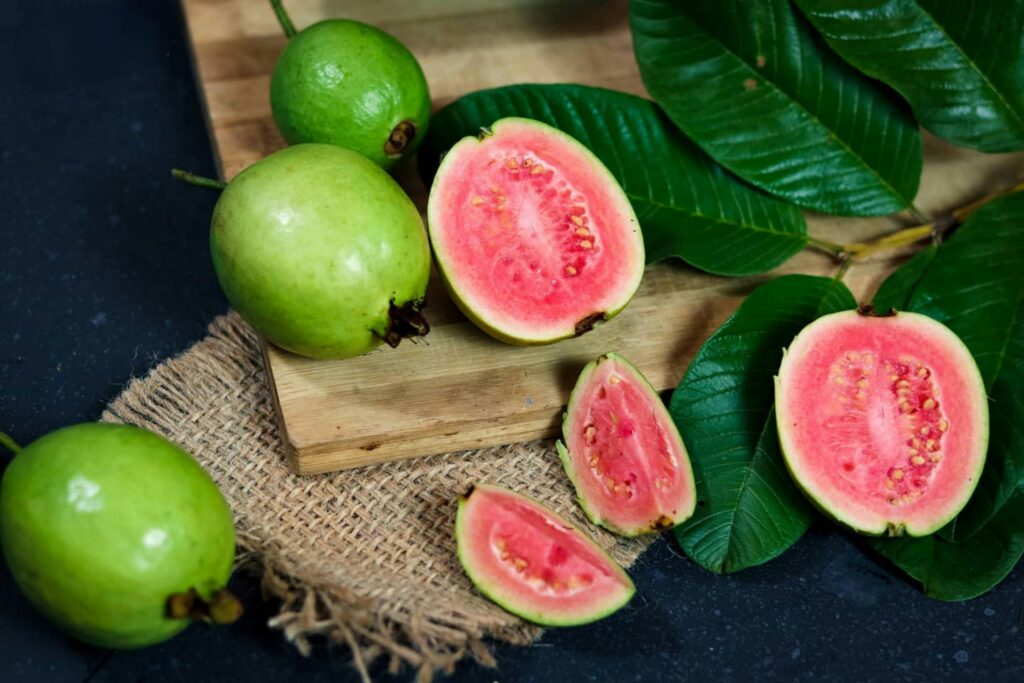
7. Guavas
Guavas are a low-calorie fruit that provide a healthy dose of vitamins A and C, with small amounts of vitamin E. Vitamin C boosts the immune system and supports skin health, while vitamins A and E contribute to eye health and protect against oxidative stress.
Guavas are also rich in antioxidants like lycopene and beta-carotene, which help fight free radicals, reduce inflammation, and lower the risk of chronic diseases. These fruits offer both nutritional value and versatility, making them a great addition to a healthy diet.
Key Highlights:
- Loaded with antioxidants that reduce inflammation and fight chronic diseases.
- Low-calorie and packed with essential nutrients.
- Versatile and easy to add to meals, snacks, and drinks.
Who It’s Best For:
- People looking for a nutritious, low-calorie fruit.
- Those interested in supporting immune health and fighting oxidative stress.
- Anyone wanting to add more antioxidants to their diet.
- People who enjoy experimenting with tropical fruits in various dishes.
8. Soursops
Soursop is a low-calorie tropical fruit that offers numerous health benefits. It is especially high in vitamin C, providing more than double the daily recommended intake in a single serving, which supports the immune system and acts as a powerful antioxidant.
Along with vitamin C, soursop is a good source of copper and potassium, essential minerals for various bodily functions. It also provides smaller amounts of niacin, riboflavin, folate, and iron. Some research suggests that soursop may help manage health conditions like diabetes, high blood pressure, and high cholesterol, and some studies have even pointed to potential anti-cancer properties, though more research is needed.
Key Highlights:
- Rich in vitamin C for immune support.
- Contains copper and potassium for essential body functions.
- Provides niacin, riboflavin, folate, and iron for overall nutrition.
- May aid in managing diabetes, high blood pressure, and high cholesterol.
Who It’s Best For:
- Those looking for a low-calorie, nutrient-rich fruit.
- People interested in immune support and nutrition.
- Anyone managing conditions like diabetes, high blood pressure, or high cholesterol.
- People who enjoy tropical fruits in smoothies, salads, or desserts.
9. Dragon Fruit
Dragon fruit, also known as pitaya, is a low-calorie fruit packed with antioxidants, such as betalains and flavonoids, as well as vitamin C, iron, and fiber. These nutrients work together to support the immune system, control blood sugar levels, and promote weight loss by reducing fat accumulation, particularly around the liver.
In addition to its weight loss benefits, dragon fruit is a great source of fiber, which aids in digestion and helps keep you feeling full. This tropical fruit provides a refreshing, nutrient-dense option for anyone looking to improve their overall health while keeping calories in check.
Key Highlights:
- Rich in antioxidants like betalains and flavonoids for immune support.
- Contains vitamin C, iron, and fiber for overall health.
- May aid in weight loss by reducing liver fat and controlling blood sugar.
- High in fiber to promote digestion and satiety.
Who It’s Best For:
- People looking for a low-calorie fruit with high antioxidant content.
- Anyone interested in weight loss or managing blood sugar levels.
- Those who want to boost their immune system and digestion.
- People who enjoy tropical fruits in various meals or snacks.
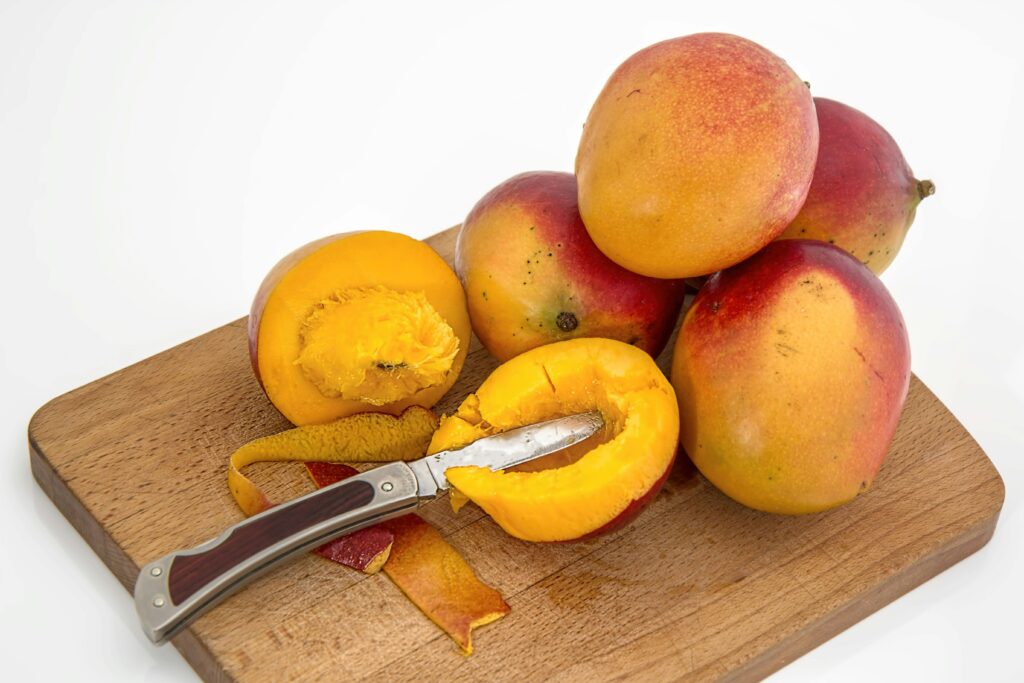
10. Mango
Mangoes are not only delicious but also offer significant health benefits. While slightly higher in calories compared to some other fruits, they remain a nutrient-dense option. Mangoes are an excellent source of vitamin C, providing a large portion of the daily recommended intake, which supports the immune system and helps protect against inflammation.
In addition to vitamin C, mangoes are rich in antioxidants that combat oxidative stress and inflammation. These nutrients contribute to overall health and may help reduce the risk of chronic conditions. Mangoes are a great addition to a balanced diet, offering a tropical burst of flavor along with essential nutrients.
Key Highlights:
- High in vitamin C for immune support and inflammation reduction.
- Rich in antioxidants that help fight oxidative stress.
- Nutrient-dense with a delicious flavor that enhances meals and snacks.
- Supports overall health and may help prevent chronic conditions.
Who It’s Best For:
- People looking for a flavorful, nutrient-rich fruit.
- Those who want to boost their vitamin C intake.
- Anyone interested in the anti-inflammatory benefits of antioxidants.
- People who enjoy tropical fruits in smoothies, salads, or desserts.
11. Pears
Pears are a delicious fruit that provides a solid dose of fiber, with both soluble and insoluble types that are important for gut health. Fiber helps nourish healthy gut bacteria, improving digestion and supporting overall wellness. A medium-sized pear provides a good amount of fiber, making it an excellent choice for those looking to improve their digestive health.
In addition to fiber, pears are packed with important nutrients that contribute to overall health. While they may have slightly more calories than some other fruits, their nutritional value, especially their fiber content, makes them a great addition to any diet.
Key Highlights:
- High in fiber, supporting digestion and gut health.
- Provides both soluble and insoluble fiber.
- Nutrient-dense, offering a range of essential vitamins and minerals.
- Helps promote satiety, making pears a satisfying snack.
Who It’s Best For:
- People looking for a fruit high in fiber to support digestive health.
- Those who want to improve gut health with a natural, nutrient-rich snack.
- Anyone seeking a filling snack to keep them satisfied.
- People who enjoy adding fruit to meals or as a quick snack.
12. Passionfruit
Passionfruit is a tropical fruit that offers a unique, tangy flavor and a wealth of nutrients. While slightly higher in calories compared to some fruits, it is still a low-calorie option, packed with fiber, vitamin C, vitamin A, iron, and potassium. These nutrients contribute to immune support, skin health, and overall bodily functions.
The fiber content in passionfruit supports digestion and helps maintain a healthy gut, while the vitamins and minerals offer a range of health benefits. Passionfruit can be a great addition to your diet, providing both flavor and nutritional value.
Key Highlights:
- Rich in fiber, supporting digestion and gut health.
- Packed with vitamin C and vitamin A for immune and skin health.
- Contains iron and potassium, which support overall bodily functions.
- Unique, tangy flavor that adds variety to meals and snacks.
Who It’s Best For:
- People looking for a low-calorie fruit with a nutrient-packed profile.
- Those interested in boosting immune health and skin care.
- Anyone seeking to improve digestion with fiber-rich fruits.
- People who enjoy exotic, flavorful fruits in their diet.
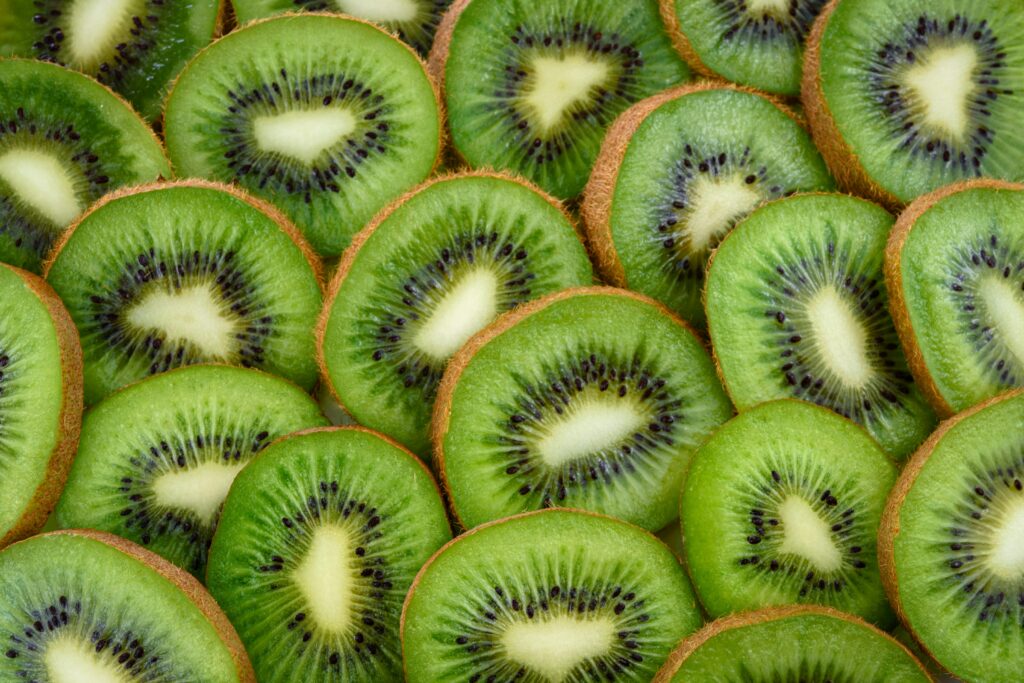
13. Kiwifruit
Kiwifruit is a low-calorie, nutrient-dense fruit that offers a wide range of health benefits. It is an excellent source of vitamin C, which supports the immune system, and vitamin E, which contributes to skin health. Kiwifruit is also high in fiber and folate, nutrients that help with digestion and overall health.
In addition to these vitamins and minerals, kiwifruit has been linked to improved blood sugar control, better cholesterol levels, and enhanced gut health. With its unique flavor and impressive nutrient profile, kiwifruit is a great addition to any diet.
Key Highlights:
- High in vitamin C and vitamin E for immune and skin health.
- Rich in fiber and folate to support digestion and overall health.
- Linked to improved blood sugar control and better cholesterol levels.
- Low-calorie, nutrient-dense fruit.
Who It’s Best For:
- People looking for a low-calorie, nutrient-packed fruit.
- Anyone seeking to improve digestion and gut health.
- Those interested in better blood sugar control and cholesterol management.
- People who enjoy adding fruits to meals and snacks.
14. Melon
Melons, including watermelon and honeydew varieties, are refreshing, low-calorie fruits that are rich in nutrients and have a high water content. They provide a modest number of calories, making them a great option for those looking for a hydrating and healthy snack.
Melons are packed with potassium, antioxidants, and vitamin C, which support heart health, immune function, and skin health. They also contain beta-carotene and lycopene, two antioxidants linked to protecting against oxidative damage. Additionally, the fiber in melons helps with digestion and promotes satiety.
Key Highlights:
- Rich in potassium, supporting heart health.
- High in vitamin C for immune and skin health.
- Contains antioxidants like beta-carotene and lycopene for overall protection.
- Provides fiber for digestive health and satiety.
Who It’s Best For:
- People looking for a low-calorie, hydrating fruit.
- Those interested in boosting heart health and immune function.
- Anyone wanting to add antioxidants to their diet.
- People who enjoy light, refreshing snacks or adding fruit to meals.
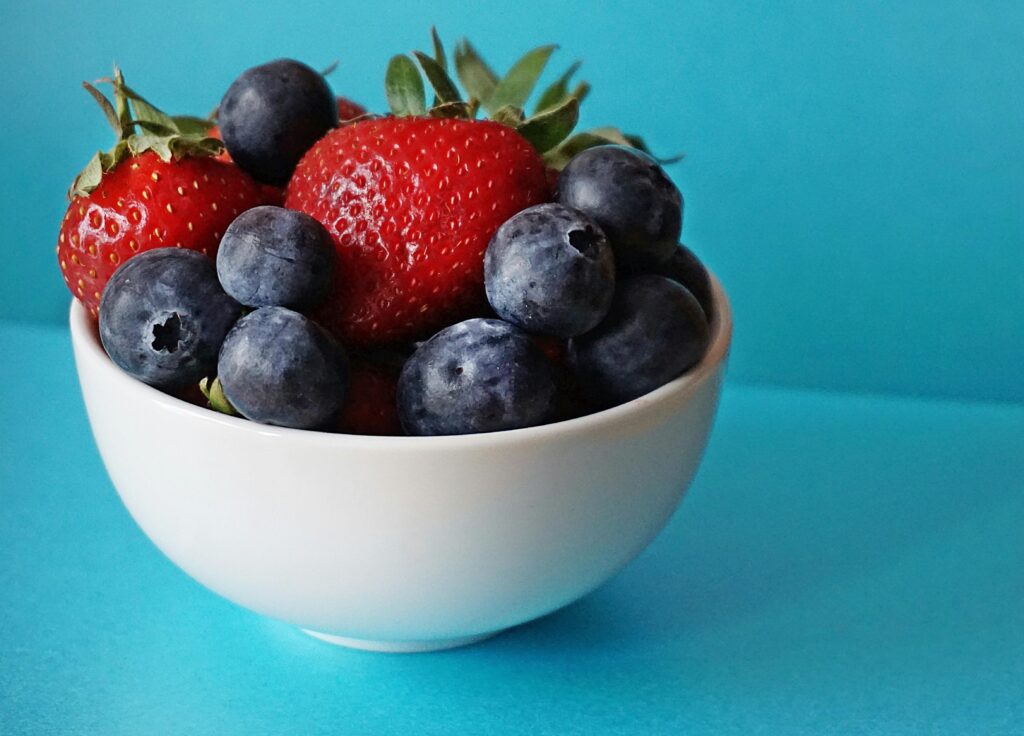
15. Berries
Berries, including strawberries, blackberries, and blueberries, are not only naturally sweet but also packed with antioxidants, making them a top choice for healthy weight loss. These fruits are low in calories while offering a wide range of health benefits.
Rich in antioxidants, berries help protect against oxidative stress and support heart health. They are also known for their fiber content, which aids in digestion and helps with satiety. With their sweet flavor and impressive nutrient profile, berries make an excellent addition to any diet.
Key Highlights:
- Packed with antioxidants that support heart health.
- Low in calories and high in fiber, promoting weight loss and digestion.
- Naturally sweet, making them a satisfying, healthy snack.
- Rich in essential vitamins and minerals for overall health.
Who It’s Best For:
- People looking for a low-calorie, nutrient-rich snack.
- Those interested in supporting heart health and reducing oxidative stress.
- Anyone seeking to improve digestion and support weight loss.
- People who enjoy adding fruits to meals, smoothies, or snacks.
Conclusion
Incorporating low-calorie fruits into your diet is a great way to stay healthy, control your calorie intake, and enjoy delicious, nutrient-packed snacks. Whether you’re aiming for weight loss, better nutrition, or simply looking for refreshing options, these fruits offer a range of benefits to support your goals. From boosting your immune system with vitamin-rich citrus to helping with digestion through fiber-packed options like berries, these fruits are an easy and tasty addition to any balanced diet.
Remember, choosing the right fruits can make a big difference in your health journey. So why not start incorporating more of these low-calorie options into your meals today? With the right planning and a little creativity in the kitchen, you can enjoy a wide variety of fruits while staying on track with your health and fitness goals.
